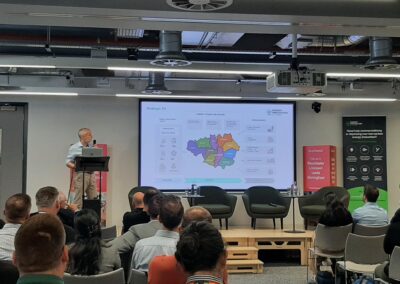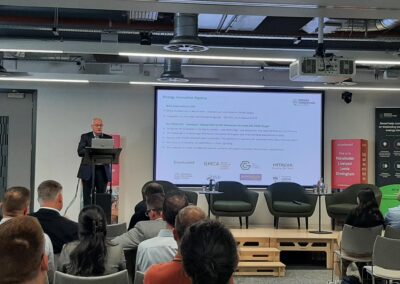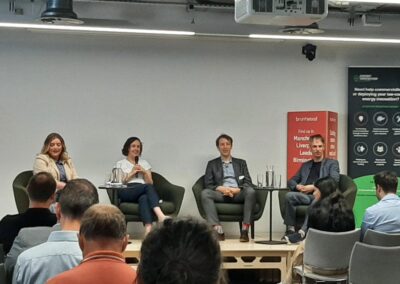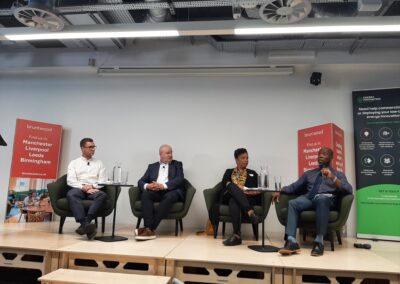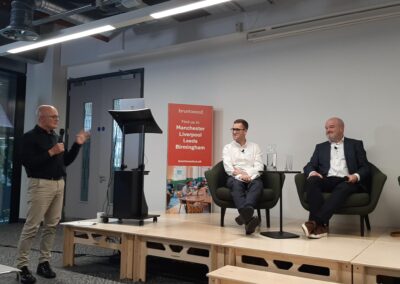Insights
Business Leaders and Innovators join forces to discuss net zero challenges
Greater Manchester Business Board (LEP) members, local business leaders and net zero innovators came together at Bruntwood’s Circle Square on 13th July 2023 for The Energy Innovation Agency’s event “Net-Zero for Greater Manchester – challenges and innovation opportunities”.
The event provided an opportunity for those passionate about decarbonising to network, allowing innovators and end users to meet with the view of closing crucial testing gaps in the innovation cycle and accelerating the commercialisation of green technologies.
Throughout the event, which was chaired by Greater Manchester Business Board (LEP) Green Lead Steve Connor, leaders in the space were invited to join panels which discussed the biggest energy challenges business are facing as well as guidance for helping them to reach net zero.
The day began with an introduction to the Energy Innovation Agency, its goals and how it works with innovators and end users to help Greater Manchester overcome energy challenges. The Energy Innovation Agency aims to create direct alignment between net zero projects and local strategy and enhance the relationship between industry and academia to position Greater Manchester as a destination of choice for innovators. It aims to create pathways to commercialisation making it more accessible and straightforward for innovators. Through cross-sector collaborations it aims to help businesses in the region overcome their biggest energy challenges, as well as helping to foster public confidence in new approaches and technologies.
Peter Emery, chair of Greater Manchester’s Energy Innovation Agency discussed the importance of investment in R&D, saying “In our view the race to net zero is simple, it’s about welcoming innovation. What we’re trying to do is get deployment at scale. Success will only be achieved when these solutions are economically attractive vs fossil fuel alternatives. Unless net zero innovations are competitive, they aren’t going to fly on a long-term basis. Broadly speaking our role is one of facilitation, support, advice and access. This is a major challenge, and we’ll try and play our part to make it happen.”
The first-panel session of the day discussed Greater Manchester’s Energy Challenges. Sarah Bateman, CEO of Unify Energy, Ben Peace Net Zero Principal at The Growth Company and Green Economy, Aisling McNulty Development Director at Bruntwood Works and Richard Hagan Managing Director of Crystal Doors joined the conversation with Steve Connor.
The panel discussed the challenges for businesses adopting green technology from a lack of investment and accessibility to a lack of knowledge and finding the right support.
Ben Peace said “A lot of businesses don’t really know where to start, they’ve heard about a range of technologies but it can be happenstance which technology they zero in on. They need support at scale, direct and on-site to know which technology is going to deliver quickly and efficiently.”
Sarah Bateman said “Accessibility is the big issue. There aren’t enough solutions in the market for SMEs to access. We’re operating in a really tough economic climate and the last thing companies want to do right now is focus on something they don’t need to do until 2030. Innovation as a word and concept may be scaring people. We are living in tough times and people will be risk averse.”
The next panel was all about The Green Skills Gap and how Greater Manchester is working to address this critical issue in the race to Net Zero. Joining Steve Connor for the panel was fellow Greater Manchester Business Board (LEP) member Dr Marilyn Comrie, Roosevelt Alexander Director of Skills at the Growth Company, Rory Matthews Senior Policy and Partnerships Officer for Low Carbon at Greater Manchester Combined Authority and Chris Fletcher GMLSIP Director and Policy Director at the Greater Manchester Chamber of Commerce.
The panel discussed the green skills gap and the benefits of Greater Manchester’s trailblazing devolution deal in solving this as well as how to improve diversity in this space and engage young people from a range of backgrounds in Green Careers. Speakers discussed the advantages of Greater Manchester’s Green Skills Academy, which is led by The Growth Company, The Manchester Innovation Activities Hub and the new GMLSIP and technical education plan.
Dr Marilyn Comrie said “The climate emergency is providing a once-in-a-generation opportunity to create a just transition. It presents an opportunity to normalise having people that look like me and my sons involved in creating the solutions that will save the planet. Because it is so pressing, it is creating a wealth of opportunities and opportunities for local people to get skills training and get into well-paid jobs.
A skilled workforce is absolutely essential, it’s not just about research, we need the people. We need to upskill, reskill and train people and we need them quickly. Employers are telling us they can’t wait for a four-year apprenticeship, they need training programmes that will help them to access people that they need now.”
Chris Fletcher said “There’s no silver bullet solution to this but it is right across the piece. It’s not just people fitting the kit, it’s the support mechanism. The business itself has a role to play to encourage people and say this is for everybody. There is such a demand for this it isn’t going to disappear anytime soon, there needs to be more engagement between businesses and potential employees.”
Rory Matthews said “What we might see down the line is the wave of enthusiasm of young people driving the change like never before. At the moment we’re at a local minimum but we need to invest more to unleash some incredible solutions.
“The devolution deal will be important to understanding the challenges at a local level and not having a one sized fits all approach that isn’t tailored to a locality and isn’t generic across Greater Manchester.”
The afternoon session provided an introduction to Innovate GM and The Built Environment Demonstrator Funding, showing innovators and businesses how they could get involved.
To learn more about The Energy Innovation Agency and how they support businesses across Greater Manchester visit their website.
The Bee Net Zero partnership has come together to simplify your business’s journey to net zero. Learn more about the support available across the region.
Will investment in culture be the secret to Greater Manchester’s future prosperity?
Cities and places are founded on heritage, traditions and industries. Creative and artistic activity helps to define, promote and maintain a spirit of place within communities and instil a sense of pride in where we live. This spirit and sense of character help to drive investment, whether that be capital investment or FDI. Creativity and the arts encourage people to live in and businesses to move to areas, they create better a better sense of place, and more attractive propositions full of character and culture.
Investment in the Creative Sector
Cultural and creative sectors themselves are a significant source of jobs and income, bringing prosperity to many and also, generating important spillovers to the wider economy. When a place’s cultural heritage is celebrated, creative people and industries are more likely to move in, facilitating investment.
In a business sense, Manchester’s cultural sector is growing. It’s already recognised as one of Europe’s largest creative, digital and technology clusters with more than 10,000 businesses including the BBC, Brown Bag Films, Mediacom and Dentsu Aegis calling the city-region home. The region now has an outstanding reputation for film and tv production, animation, digital and design. It has a wealth of specialist-creative talent that allows creative and media businesses to thrive.
Salford’s MediaCityUK boasts a huge success story for the region’s creative and digital investment, investment in the arts is allowing other towns and boroughs to follow suit. Bolton is becoming a renowned filming location, attracting big Hollywood hitters. The town is investing £7.24m in the refurbishment of the council-owned Wellsprings office building to create an innovation hub for digital and creative industries which will be at the heart of the town’s regeneration masterplan. Stockport too received £2.63m last year from DCMS to deliver a creative campus in the town centre, transforming it into a new digital arts neighbourhood. Providing the physical infrastructure and specialist resources needed to grow the next generation of creative and digital businesses while also working with the community to encourage engagement in culture.
The Role of Culture in Placemaking
However, the benefits of using arts and culture to tap into a place’s unique character extend beyond the creative sector. Combining culture, placemaking and community building stimulates local economies and leads to increased innovation, cultural diversity, and civic engagement. Across sectors, today’s leaders and policymakers are increasingly recognising how culture-based placemaking initiatives can help to support the development of transportation, housing, employment, health care, environmental sustainability, and education by using the arts to strengthen communities and create a fairer, more prosperous city-region for all.
Culture helps to build strong, healthy, and resilient places, strengthening communities and driving social change. It creates vibrant places to live for people of all ages, whether they’re recent graduates or raising a family, encouraging gentrification and investment into areas.
Traditionally, it was thought that culture follows from economic development with affluent cities having more to spend on art galleries, museums and cultural spaces, yet we’re now learning that redevelopment follows culture. Creativity fuels value and when a vast number of people want to live in a town or city, investment must follow.
The arts have always played a central role in the life of our cities and communities, with Manchester city centre being a prime example, and so it’s becoming clear that the arts need to be a central component in future planning discussions as well further investment negotiations.
Manchester’s cultural sector
2023 is set to be a huge year for Manchester’s cultural sector, with the city and wider city region ready to reaffirm its place on the global cultural map.
Manchester has always been renowned for its contribution to popular culture, from genre-defining bands to ground-breaking literary talent. It’s already a UNESCO City of Literature and is celebrated for having a dynamic art and music scene. However, with the opening of Aviva Studios, the home of Factory International this year and Co-Op live next spring, Manchester is about to become a cultural powerhouse once again, attracting some of the biggest international names in art, music, dance and other creative fields. The return of the Manchester International Festival (MIF) this month has already seen global names in the world of art like Yayoi Kusama exhibiting and creating work across the city, showing the calibre of creativity Manchester can produce when it puts culture at the fore. The home of Factory International and MIF, Aviva Studios is set to be a game-changer for the city-centre, the state-of-the-art arts space will help engage communities with the arts, provide new opportunities for careers in the creative sector and fuel Manchester’s reputation as a creative city across the globe.
Manchester city centre is a prime example of culture fuelling growth, after seeing 20,000 people move into the city centre in the past decade, increasing Manchester’s population by twice the average UK growth rate. Economic forecasts indicate the next decade will see continued growth for the city, with 65,000 extra jobs. Increasing total city centre employment to 315,000 by 2040. We would be naïve to think that Manchester’s strong sense of self didn’t have some involvement in making it a popular destination to live, work and invest in. Manchester is a city very in tune with its industrial heritage and cultural impact, it’s bold and brash in its messaging in a way that makes people and businesses not only stop and listen but respect the city’s offering.
Making our towns cultural hotspots
However now, outside of the city centre, the region’s towns too are being recognised for their cultural importance. Not only are these places able to offer an affordable lifestyle just minutes away from the vibrancy of Manchester’s cultural scene, but these towns are celebrating their heritage and culture while strengthening their sense of community.
For example, Stockport has now been named Greater Manchester’s Town of Culture for 2023, with a £50,000 investment to support arts and creativity in the borough through events and activities. Rochdale too has recently received £8.5m funding from Arts Council England to invest in arts and culture over the next three years, which will be used to create a new visual arts-led creative hub as well as a cultural district in the town centre.
In Greater Manchester, this renewed focus on culture has the potential to be transformative for our people and places. Although not a standalone factor for investment, cultural capital plays a huge role in the development of urban neighbourhoods and the creation of jobs. It should never be an add-on but instead is proven to be a key contributor to urban economic growth alongside transport links, health and wellbeing, housing, green spaces and employment. Culture will make our towns and spaces more attractive to businesses, residents and investors.
During a year that will reaffirm Greater Manchester’s international standing as a cultural hotspot, investment in both our city centre and town’s cultural offerings provide an exciting platform for future development, investment and prosperity. From further investment into the creative sector to creating in-demand places to live with an enviable lifestyle, Greater Manchester’s cultural offering is about to change the face of the region. It’s exciting to think how our towns will develop over the twelve months as culture becomes Manchester’s lifeblood once again.

Manchester International Festival returns with new home, Aviva Studios
The 2023 edition of the Manchester International Festival (MIF), presented by Factory International, has begun this week with a host of world premieres and special events by artists from around the world unveiled in venues and spaces across the city.
For the first time, the festival will take place at Manchester’s landmark new cultural venue, Aviva Studios offering audiences an opportunity to preview the building ahead of its official opening in October.
A major exhibition of Yayoi Kusama’s inflatable sculptures forms a centrepiece of the Festival and is the first work to be presented at Factory International’s new home. You, Me and the Balloons takes over the vast warehouse space of the building, inviting audiences to take an exhilarating journey through Kusama’s psychedelic creations, most of which have not been seen before in the UK.
Other events include a collaboration exploring art and the beautiful game by curator Hans Ulrich Obrist and footballer Juan Mata, new work by Tino Sehgal, a mixed reality concert by the late Japanese composer Ryuichi Sakamoto, a live photographic performance by Benji Reid and a musical adaptation of a cult queer classic by Philip Venables and Ted Huffman. The expansive programme of new work premiering at the Festival sees art forms merge, breaking new creative ground and challenging perceptions.
A diverse programme of music acts will take to the stage in the Hall of Aviva Studios, including Angélique Kidjo, Alison Goldfrapp and revered Sufi singer Sanam Marvi. While the ever-popular Festival Square will relocate to the outdoor spaces of Aviva Studios with free live music from over 190 performers, and a wide variety of food and drink, creating a new riverside destination for the city.
Events are also taking place in spaces and places across the city – including a quest for collectable coin artworks by Ryan Gander, a celebration of our connection to water on the banks of the River Medlock by Risham Syed and Angie Bual, and a chilling adaptation of a lost dystopian masterpiece in the depths of the John Rylands library by Maxine Peake, Sarah Frankcom and Imogen Knight.
Greater Manchester residents are once again at the heart of MIF23, from performing on Festival Square to volunteering in an array of roles across the Festival. Many of the works reflect on the personal experiences of the city’s diverse communities, from youth-led performances, and exhibitions surrounding mental health as part of Balmy Army to a futuristic and interactive journey through Manchester by Blast Theory and Manchester Street Poem led by those most marginalised in the city.
John McGrath, artistic director and chief executive of Factory International said: “Asking big questions about the world and our future, while also providing many moments of joy and celebration, MIF23 brings artists from a huge range of backgrounds to Manchester to create a thrilling range of work: from a ritual on the banks of a newly uncovered river to a mixed reality concert from one of Japan’s greatest composers, from a hunt for artworks across the city to a collaboration exploring art and football.
“As always, MIF is rooted in the spaces and places of Greater Manchester. So whilst we welcome the first visitors to our new home, Aviva Studios, to experience Yayoi Kusama’s incredible inflatable sculptures and an array of music inside and outside the venue, the Festival continues to extend its reach throughout the city in a true celebration of Manchester and its cultural offerings.
“This Festival is a genuine melting pot of creativity, designed to take the temperature of our times and imagine possibilities for the future. From homegrown talent to trailblazers from the far reaches of the globe, each of this year’s artists brings unique work and ideas to the programme which I’m thrilled to see shared with the world.”
MIF23 also provides the first opportunity for audiences to experience Aviva Studios, ahead of its official opening in October.
Designed by Ellen van Loon, OMA Partner and lead architect, the ultra-flexible building is based around vast, adaptable spaces that can be constantly reconfigured, enabling artists to develop and create large-scale work of invention and ambition of a kind not seen anywhere else in the world. It is the largest new national cultural project since the opening of Tate Modern in 2000 and is made possible thanks to initial HM Government investment and backing from Manchester City Council and Arts Council England.
Culture Secretary Lucy Frazer added: “I am delighted to see events at this year’s Manchester International Festival taking place in its new home, Aviva Studios, which has been made possible by £100 million of Government investment.
“The venue will provide a showcase for the city’s magnificent artists and act as a centre for creativity, collaboration and innovation helping to maximise Manchester’s creative potential – both growing the economy and supporting opportunities for developing talent.”
As one of Arts Council England’s National Portfolio Organisations, Factory International has been generously supported by public funding.
For the full – extensive – MIF23 programme and to purchase tickets please visit Factory International.

Health Innovation Manchester Reveals Innovation Accelerator Projects
This week Greater Manchester launched its new multi-million-pound health innovation accelerator by revealing the projects that the two-year programme will support.
The Health Innovation Accelerator aims to rapidly improve the diagnosis and treatment of disease across Greater Manchester’s population, helping to address health inequalities. The health innovation accelerator will focus on tackling some of the most challenging disease areas through early diagnosis using novel approaches and holistic treatment aligned to people’s specific needs. It is hoped this will help to save more lives and improve health outcomes for people at high risk or living in the most disadvantaged communities.
Health innovation brings together academic institutions, innovators, businesses, NHS assets, healthcare providers and local authorities to create tangible solutions to the region’s healthcare needs.
Through working with innovative projects that focus on early diagnosis, it’s hoped that the Health Innovation Accelerator programme will be a catalyst for broader research throughout Greater Manchester. This Accelerator will form the basis of the creation of a health innovation ecosystem, becoming a major globally competitive centre for research and innovation.
The Acceleration Innovator launch event in Manchester City Centre on Monday 19 June 2023 began with a poignant reminder of why early diagnosis is so important by sharing the patient’s perspective of Russ Cowper. All of the projects funded by the Accelerator prioritise early diagnosis of health issues that affect large communities across Greater Manchester, particularly ethnically diverse or socio-economically deprived areas.
Then Ben Bridgewater, CEO of Health Innovation shared the ambitions for the Innovation Accelerator programme before the spotlight was turned on the delivery projects.
Innovators and project leaders discussed what their share of Innovation Accelerator funding aimed to achieve, how they would research and the common health issues in Greater Manchester communities that it hopes to address.
The Health Innovation Accelerator projects are:
- DEVOTE – Development and Validation of Technology for Time Critical Genomic Testing – rapid genomics testing to improve care and benefit whole communities, where previously this technology took days or weeks and was very exclusive. This solution will address issues like adverse drug reactions, strokes and issues surrounding pain relief.
- EARLY HF – Detecting EARLY Heart Failure in Greater Manchester – developing a risk prediction tool to give an idea of those at high risk of heart failure in ethnically diverse or socially deprived areas.
- Redesigning liver care pathways to target under-served high-disease burden communities – liver disease is the 3rd biggest cause of premature death in Greater Manchester, this project would raise awareness of liver disease risks, bring liver health checks to communities and use AI to develop risk prediction algorithms
- Chronic Kidney Disease Risk Stratification – to identify when a person has chronic kidney disease or type 2 diabetes to slow down the progression to failure
- Integrating real-time POCT into lipids Management – supporting the management of high cholesterol through early diagnosis.
- Remote Spirometry ADA – improving access to spirometry making it more affordable and user-friendly to support patients with asthma and respiratory conditions.
- Lung Health Checks – the lung health check was born in Greater Manchester as mobile screening offers holistic intervention to people at risk. Building on the lung health check to research in communities and make screening more accessible.
- Pre-Hospital Diagnosis of Acute Coronary Systems – an early diagnosis disease to identify heart attacks, the most common reason for a 999 call. Anyone who needs care can then be taken immediately to the necessary care, and low-risk patients can either bypass A&E triage or stay at home. This will reduce unnecessary ambulance use and improve rapid response to those who need it.
Ben Bridgewater CEO of Health Innovation Manchester said: “Addressing inequalities is now at the top of the city-region agenda. As we roll out innovation, we need to do it in a way that addresses inequalities. We need to have a much stronger, more resilient ecosystem from this, with better connectivity across projects, a focus on digital will ensure this connectivity.”
Rowena Burns, Chair of Health Innovation Manchester said: “One of the things that health innovation Manchester was set up to do was to bring together all of the assets in Greater Manchester, the academic institutions, industrial assets and our NHS assets, to develop novel solutions to real problems.
“Success for this type of initiative attracts more success. It improves our reputation and means businesses will want to move here, creating highly skilled jobs.”
Chief Officer for Strategy & Innovation at NHS Greater Manchester Integrated Care said “We have to shift the system from one that is trapped in a crisis response to one that can respond and act. The need for us to spread innovation is real and is a central part of a strategy we need to pursue as an integrated care system.
“The brief for an innovation ecosystem is easy to create but hard to deliver. It must be responsive to the people and their needs. It needs to be coordinated in a way that is set to reduce inequalities, which needs to be a key aim. We have to be forensic and purposeful about addressing barriers and it needs to be deployed at scale.”
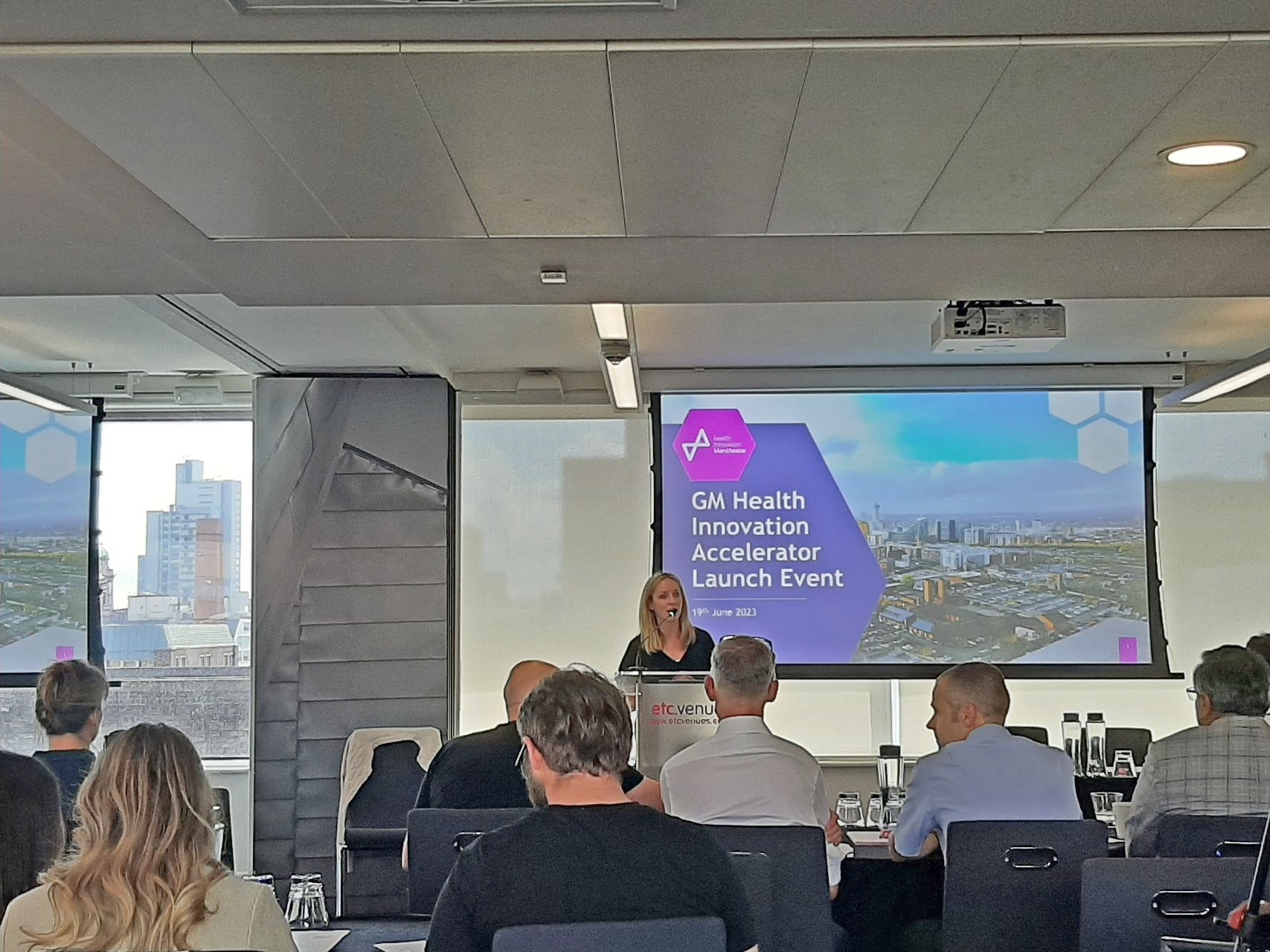
North West improves its FDI rankings with strong growth in 2022
The North West has jumped two places in the UK rankings for Foreign Direct Investment projects. EY’s latest UK Attractiveness Survey, which was published on June 19 2023, has revealed that the region has jumped from fifth place in 2021, to third place in 2022.
The survey reveals that the North West attracted 88 FDI projects in 2022, up 19% from a total of 74 the year before. Meanwhile, overall UK projects fell by 6%, from 993 to 929. Only London (299) and Scotland (126) attracted more FDI projects than the Northwest in 2022.
While the UK as a whole saw projects in Digital Technology fall by almost a quarter, the North West bucked this trend, with Digital Technology projects in the region up by 25% year-on-year.
The region’s strong performance in 2022 was also underpinned by significant growth in project numbers for the Electronics & IT and Finance sectors, while Sales and Business Services, Manufacturing and Research & Development were the North West’s most prominent FDI activities.
The North West’s share of all UK projects increased to 9.5%, surpassing its recent peak of 8.7% in 2020.
Excluding London, Manchester attracted more FDI projects than any other UK city in 2022 with a total of 45, up from 31 in 2021.
Stephen Church, EY’s North market leader, said: “The North West delivered a strong FDI performance in 2022, cementing its place as one of the most attractive regions for foreign investment in the UK.
“The increase in digital tech projects in the region, amid a nationwide decline in project numbers, is particularly notable.
“This growth aligns with the continuing appetite our transactions teams in the North have seen for investment into digital technologies and capabilities in the Mergers and Acquisitions market in recent months.
“The North West’s diverse sector mix also played a key role in 2022’s performance, with growth supported by significant year-on-year gains in the Finance and Transportation Manufacture and Supply sectors.
“The excellent results across the North also demonstrate how regional and local leaders can help create business-friendly environments that align with an area’s specific strengths, challenges and needs.
“By empowering local areas to make decisions and implement policies that both support and encourage inward investment, the UK can take further advantage of its regional strengths and unique selling points to attract diverse investment opportunities.”
Of England’s nine regions, respondents ranked the North West as the fourth most likely destination for planned FDI projects, with 5% saying they were planning to expand or establish operations in the region, compared with 43% for top-ranked London. The East of England and Yorkshire and the Humber were just ahead of the North West on 6%.
The region’s top three sectors (Digital Technology, Finance and Electronics and IT) contributed a combined total of 32 FDI projects in 2022, with a total combined growth of 11 extra projects year-on-year.
Digital Technology was the North West’s frontrunner, accounting for 20 projects, up from 16 in 2021. Meanwhile the Electronics and IT and Finance sectors were joint second, accounting for six projects each.
Sales and Marketing was the top activity driving the North West’s FDI projects in 2022, with 41 projects, followed by manufacturing on 19 – up from 12 last year. Research & Development was the third most common activity in 2022, with 14 projects, up from 11 in 2021.
Despite encouraging growth in project numbers, the region had the third lowest number of jobs per project in England at 42 – although this was well ahead of London’s 32 jobs per project.
Nationally, more than half of the UK’s nations and regions attracted more Foreign Direct Investment (FDI) projects in 2022 than they did in 2021. The UK hosted 929 FDI-backed projects in 2022, the second highest project total in Europe, albeit down 6.4% from 993 projects in 2021.
London (299 projects) was still home to the most FDI projects out of any UK nation or region in 2022, but its share of all UK projects has fallen to 32% from a high of 49% in 2019.
Scotland (126 projects), the North West (88) and West Midlands (74) recorded the most projects outside London, while the biggest gains in England from 2021 were seen in the North East (33%), Yorkshire and the Humber (28%) and the East Midlands (23%).
The strong results across the North – all three regions saw double-digit growth – were underpinned by resilience in the digital sector and growth across a range of key activities, including manufacturing, sales, research and development, logistics, and headquarters projects.
Meanwhile, declines in the digital sector were the biggest drag on performance for the South of England. Digital projects in London almost halved, from 194 in 2021 to 107 in 2022, with significant falls also seen in the South East and South West. Despite this, the UK still led Europe for tech FDI.
Across Europe, France held onto top spot for total project numbers for a fourth consecutive year, although the UK once again ranked highest in Europe for new projects and continued to deliver more total jobs and jobs per project than Germany and France – trends consistent with the UK’s pivot in strategy to focus on value over volume when attracting FDI.
Hywel Ball, EY’s UK chair, said: “The strong FDI performance of Scotland, Wales and England’s regions in 2022 is a clear success for the UK.
“Notably, when asked to identify the policy area in which improvements would most increase the UK’s attractiveness, the investors we surveyed were most likely to pick the geographic rebalancing of the UK economy. While London’s attractiveness will endure, despite ups and downs, policymakers need to build on the clear interest in investment outside the capital.”
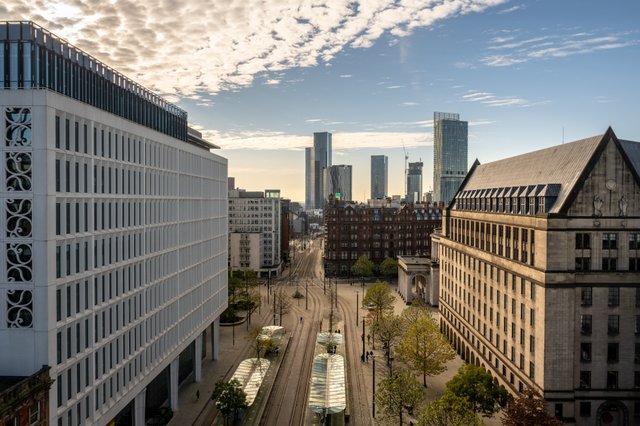
The University of Manchester leading innovation in hydrogen economy
The University of Manchester has been given funding from The Department for Energy Security and Net Zero for a new R&D project to boost innovation in the hydrogen economy.
The University will lead an international team to build and demonstrate a new technology to produce syngas and pure hydrogen with nearly zero direct carbon dioxide emissions.
This £ 5.1 million collaborative project funded by the Department for Energy Security and Net Zero, specifically part of the Net Zero Innovation Portfolio (NZIP), also involves five world-leading industrial partners in the area of engineering for sustainable development: Johnson Matthey, TotalEnergies OneTech, Kent, Helical Energy and Element Energy.
The RECYCLE project (REthinking low Carbon hYdrogen production by Chemical Looping rEforming) will construct and test a fully integrated innovative hydrogen production pilot unit at The University of Manchester.
The technology is based on chemical looping reforming using fixed bed reactors which allow modular units and cost-effective solutions for hydrogen production using different feedstocks, with inherent carbon dioxide capture and separation at high purity.
The final demonstration is planned for the second half of 2024 in the pilot area of the James Chadwick Building at The University of Manchester.
The UK is leading the industrial revolution to achieve carbon neutrality by 2050. In the recently published Powering Up Britain: Energy Security Plan, the UK government is expecting to have two gigawatts of low-carbon hydrogen production capacity in operation or construction by 2025 and 10 gigawatts in 2030, subject to affordability and value for money.
The RECYCLE project presents an opportunity to show continued innovation in the development of resilient and cost-effective solutions for a low carbon future.
Minister for Energy Efficiency and Green Finance Lord Callanan said: “Hydrogen, known as the super fuel of the future, is critical to delivering UK energy security and clean, sustainable growth.
“I’m delighted that we have awarded funding to The University of Manchester so that they can build and test their first-of-a-kind hydrogen technology. This will generate opportunities for UK businesses to export their expertise around the world whilst supporting our ambition to have amongst the cheapest energy in Europe.”
Dr Vincenzo Spallina, Senior Lecturer at The University of Manchester and Principal Investigator of the RECYCLE project, said: “The feasibility study carried out during Phase 1 demonstrated great potential for low carbon hydrogen in the UK market and it has huge implications for several industrial stakeholders. This project will demonstrate its feasibility at a pre-commercial scale to increase awareness of the next steps towards commercial implementation.
“The demonstration plant will be installed in the James Chadwick Building where we are currently renovating the existing pilot hall area to establish the Sustainable Industrial Hub for Research and Innovation on sustainable process technologies. Our students will have the fantastic opportunity to see the next-generation hydrogen plant in operation as a unique teaching and learning experience. “
Professor Alice Larkin, Head of the School of Engineering at The University of Manchester, added: “Our University is committed to achieving zero carbon emissions by 2038 as part of its Environmental Sustainability Strategy and supported by activity through our Advanced Materials and Energy research beacons. This collaborative project will boost the prestige of our academic community to secure clean and sustainable development through Science and Innovation in close partnerships with industries.”
Silvian Baltac, Associate Partner and Industrial Decarbonisation lead at Element Energy, an ERM Group company, said: “We are delighted to continue supporting the University of Manchester and the RECYCLE Consortium with the Phase II of the project. Element Energy, a leading low-carbon consultancy, will help develop the go-to-market strategy for the RECYCLE technology, as well as support the Consortium with strategic communications and engagement, ensuring learnings from the project are disseminated with industry, academia, and the wider energy sector.”
Mark Wickham, CEO of HELICAL ENERGY, commented: “Our business is fully committed to achieving zero carbon emissions by 2038, by helping to develop and build neutral and negative carbon emissions technologies. This exciting collaborative project with the University of Manchester and industry partners will broaden our knowledge and experience in translational energy and build upon the work we are currently doing with other universities on carbon capture and hydrogen from biogenic fuels. RECYCLE is a fantastic innovative project that will make a significant contribution to carbon neutrality.”
Les Newman, Engineering & Consulting Managing Director at Kent, said: “We are delighted to be part of this cutting-edge project. It is aligned with Kent’s purpose to be a catalyst for energy transition and an exciting addition to our blue hydrogen project portfolio. We look forward to working with the University of Manchester and the consortium partners to advance the progress of this novel low-carbon hydrogen and carbon capture technology.”
Suzanne Ellis, Innovation Director for Catalyst Technologies at Johnson Matthey, said: “Johnson Matthey works with partners around the world to apply our expertise in synthesis gas, process technology and catalysis to enable a transition to a net zero future. We are delighted to be part of this consortium led by University of Manchester, exploring the potential for this promising next generation technology to be moved through to industrial impact, whilst also inspiring the next generation of scientists and engineers.”
The Department for Energy Security and Net Zero provides dedicated leadership focused on delivering security of energy supply, ensuring properly functioning markets, greater energy efficiency and seizing the opportunities of net zero to lead the world in new green industries.
The funding from the Low Carbon Hydrogen Supply 2 programme comes from the department’s £1 billion Net Zero Innovation Portfolio, which provides funding for low-carbon technologies and systems and aims to decrease the costs of decarbonisation helping enable the UK to end its contribution to climate change.


